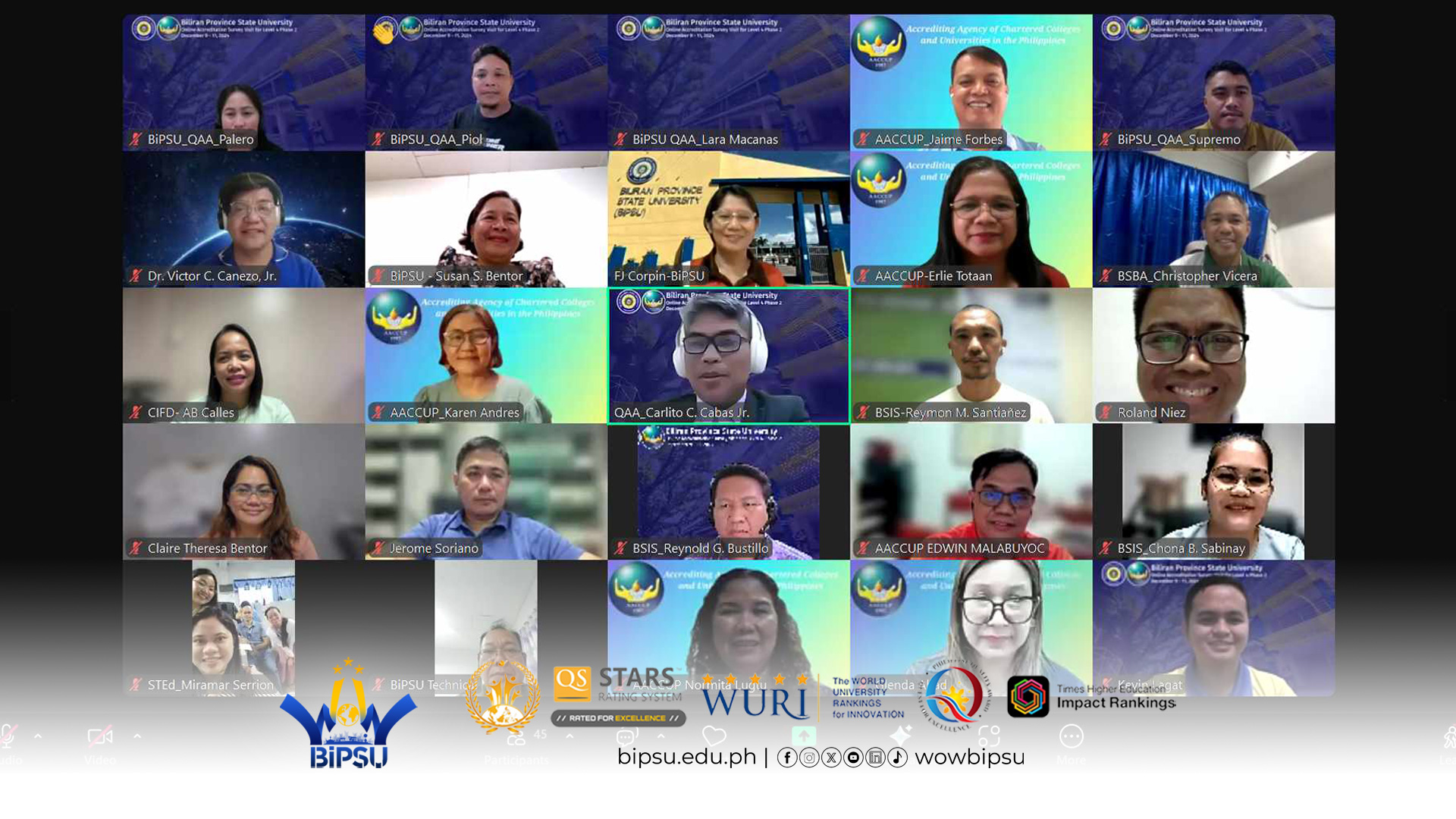To signify its commitment to meeting global standards of academic excellence and quality assurance, the Biliran Province State University (BiPSU) subjected to three-day Accrediting Agency of Chartered Colleges and Universities in the Philippines (AACCUP) Level IV Phase 2 online accreditation survey visit on December 9-11 via zoom.
Four schools of the main campus, namely School of Arts and Sciences (SAS), School of Teacher Education (STEd), School of Technology and Computer Studies (STCS), and School of Graduate Studies (SGS) passed through rigorous evaluations for its programs Bachelor of Science in Business Administration (BSBA), Bachelor of Secondary Education (BSEd), Bachelor of Science in Information Systems (BSIS), Master of Arts in Education (MAEd) - Educational Management and Master in Public Management (MPM), respectively, in hopes to achieve the highest level of recognition a higher education institution can achieve in the country—the Level 4 Phase 2 accreditation grant.
Headed by Dr. Jaime M. Forbes, AACCUP coordinator and campus director of Bataan Peninsula State University (BPSU), panel of the accreditors bring together Dr. Sisenando C. Masangcap Jr. of BPSU and Dr. Jerome D. Soriano of Tarlac Agricultural University (TAU) for the SAS inspection; Prof. Karen P. Andres, president of Ramon Magsaysay State University, and Prof. Normita M. Lugtu of BPSU for the STEd survey; Dr. Enrico R. Rivano of Laguna State Polytechnic University and Dr. Julius A. Sareno of the Technological University of the Philippines for the STCS assessment; Dr. Lourdes S. Santos and Dr. Glenda D. Abad of BPSU, Dr. Erlie Totaan of TAU, and Dr. Erwin G. Malabuyoc of Polytechnic University of the Philippines for the SGS critique.
During the announcement of general impressions and comments, Dr. Forbes delivered the evaluation results summarizing the salient points of the team.
“Allow me to use the mnemonic BIPSU to represent our analysis. B for breakthrough research, I for international linkages and partnerships, P for performance of the graduates, S for strategic community service, and U for unique planning process,” he stated.
According to Dr. Forbes, the five academic programs mentioned above have well-established research agenda aligned with community needs which not only provide practical applications but also contribute to scholarly work that enhances the institution’s academic standing, addressing educational challenges. Moreover, he noted that the university has established strong international linkages that enhance global collaboration and exchange programs, which makes its international efforts commendable.
Further, he commended the excellent licensure examination results and employment rate of graduates which highlights BiPSU’s success in preparing competent leaders. Community extension programs, meanwhile, are integrated into the college's operations, and the schools actively implement a wide range of extension services aimed at enhancing the overall welfare and quality of life within the community, promoting sustainable development and empowering individuals.
Additionally, he lauded the university’s well-structured planning framework that ensures continuous quality improvement and sustainable program development. Driven by data and aligned with institutional goals and global education standards, BiPSU’s excellence is reflected in its International Organization for Standardization (ISO) certification and recognition by the Quality Assurance Agency for Higher Education (QAA) and the World University Rankings for Innovation (WURI).
In his acknowledgement and statement of commitment, University President Dr. Victor C. Cañezo reaffirmed BiPSU's promise to hold on to the core strengths and values that define who they are as an academic community, and pledged to engage actively with all identified areas for enhancement.
“Where there is room to improve, we will lean in with an open mind, willingness to adapt, and the courage to do what must be done to advance our institution. Excellence is never a static achievement; it’s a continuous journey toward becoming more responsive, more effective, and more impactful in our mission,” he said.
This agrees with what Dir. Carlito C. Cabas Jr., BiPSU Quality Assurance and Accreditation director, said. “The transformation of a system is not a linear process, but a series of up and down trajectories that lead anticipation and foresight to make it successful.”
The accreditors’ report will be reviewed and validated by the AACCUP and approved by the National Network of Quality Assurance Agencies’ (NNQAA) board of directors.
Crucial results of this accreditation will be released soon by the act of the secretariat.
#WoWBiPSU
[This article aligns with Sustainable Development Goal (SDG) 4: Quality Education]
-
 0
0
-
 1
1
-
 0
0
-
 0
0
-
 0
0
-
 0
0

